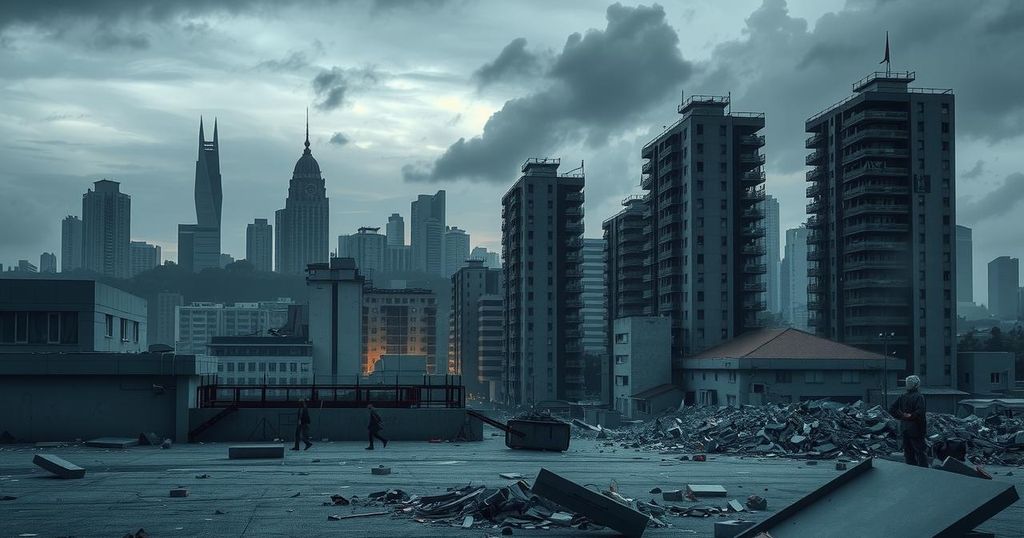Crime
AFP, ARMANDO BENEDETTI, ASIA, CALI, CARLOS FERNANDO TRIANA, CENTRAL GENERAL STAFF, COLOMBIA, CORINTO, CRIME, CUBA, ELIZABETH DICKINSON, EMC, FARC, GANG VIOLENCE, GUA, GUN VIOLENCE, INDIA, INTERNATIONAL CRISIS GROUP, LUZ AMPARO, MIGUEL URIBE, NATIONAL POLICE, NORTH AMERICA, PROTESTS, SOUTH AMERICA, VIOLENCE
Daniel O'Connor
0 Comments
Seven Dead as Colombia Experiences Wave of Bombings and Gun Attacks
At least seven people were killed in coordinated bombings and gun attacks in southwestern Colombia, centering around Cali and nearby towns. The National Police suspects a local guerrilla group, and fears of escalating violence are prevalent, heightening since a recent assassination attempt on Senator Miguel Uribe. Experts believe these attacks showcase heightened operational capabilities of the dissident faction of FARC, complicating government attempts at peace deals.
CALI, Colombia – A series of coordinated bombings and gunfire shook Colombia’s southwest on Tuesday, leaving at least seven people dead in a wave of violence that has left the nation grappling with a deepening security crisis. The attacks, which hit police posts, municipal buildings, and civilian sites, occurred in Cali, the country’s third-largest city, as well as nearby towns.
National Police Chief Carlos Fernando Triana reported that attackers, believed to be affiliated with a local guerrilla faction, had employed car bombs, motorcycle bombs, rifle fire, and possibly a drone in their assaults. The confirmed death toll stands at seven with many more injured, as police noted that two of the deceased were police officers.
Footage from the scenes showed significant destruction, including wrecked vehicles and damaged buildings, particularly in the towns of Villa Rica, Guachinte, and Corinto. Eyewitnesses, including journalists from AFP, documented the chaos, exposing the aftermath of the violent acts. This violence comes just days after an attempted assassination of presidential candidate Miguel Uribe in Bogota, which has instilled fear and anxiety across the nation.
Colombians are increasingly worried about reverting to the violent turmoil of the 1980s and 1990s, an era dominated by cartel-related attacks and guerrilla conflicts. Interior Minister Armando Benedetti indicated that the government had received unverified evidence regarding possible guerrilla connections to the assassination attempt on Senator Uribe.
In Corinto, local resident Luz Amparo described the moment the bomb struck her bakery. “We thought it was an earthquake,” she expressed, recalling how the blast turned her familiar surroundings into ruins. Such eyewitness accounts highlight the terrifying reality faced by locals amidst the violence.
Experts say the series of attacks is likely linked to a dissident faction of the FARC, specifically a group termed as the Central General Staff (EMC). Security analyst Elizabeth Dickinson from the International Crisis Group emphasized the extent of this group’s capabilities, remarking, “This is a particularly well-coordinated offensive… It really demonstrates the capacity that the group has built.” She asserted that the group may be reacting to military operations against their leadership.
In a somewhat ominous development, the EMC issued a statement advising the public to avoid military and police areas while refraining from openly claiming responsibility for the assaults. Just three days prior to the bombings, Senator Uribe was shot twice in the head during a campaign appearance, leaving many surprised and concerned about the underlying threats faced by politicians in Colombia.
A minor, aged 15, has slumped into court pleading not guilty to accusations of being the hired gun behind the assassination attempt. President Gustavo Petro has weighty concerns, with some speculation hinting at orders coming from an international mafia. Amidst this, he noted a suspicious reduction in the security detail on the day of the shooting.
In summary, Colombia faces a surge of violence that has resulted in multiple fatalities, attributed primarily to suspected guerrilla groups. Amid increasing fears of a resurgence in past conflicts, the government grapples with security challenges while striving to differentiate between dissident factions and broader national stability. The combination of recent attacks and attempts on political figures underlines a complicated landscape requiring urgent attended resolution and effective policy implementation.
Original Source: globalnation.inquirer.net




Post Comment